| Player interview by Jon Olkowski (Jonny O)
Date: November 2010
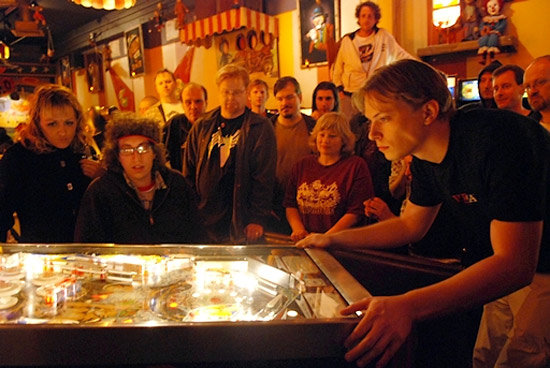
I was first introduced to Cayle George by Neil Shatz in 2009 at the Pacific Pinball Expo, my first big pinball tournament. Cayle was an immediately likable sort of guy with an easygoing attitude, but a few minutes of watching him on the flippers told me he was all business when it came time to play. Seeing Cayle and other truly great players put on an amazing show early in qualifiers I decided I would do whatever it took to make the novice playoffs that year.
This past year I was back at the Pacific Pinball Expo and more excited than ever about competing in tournament pinball. I spoke with top-10 player, Andrei Massenkoff, about doing an interview, but he suggested the upcoming PPE as an excellent chance to meet and interview another great player while he was in town. “Who did you have in mind?” Andrei didn’t hesitate for a moment: “The guy I would like to see is Cayle George”.
PBN: Cayle, when did you first start playing pinball? What game or experience got you hooked?
Cayle: Some of my first pinball memories are from Iceland in Berkeley CA where I grew up. When I was in grade school kids would always have birthday parties there. We would play games while the Zamboni drove around the ice rink. I would always go and play Bride of Pinbot and Police Force. I remember thinking the "Shark Guy" in Police Force was a super cool dude, and, the game was extra awesome as it had a center post!
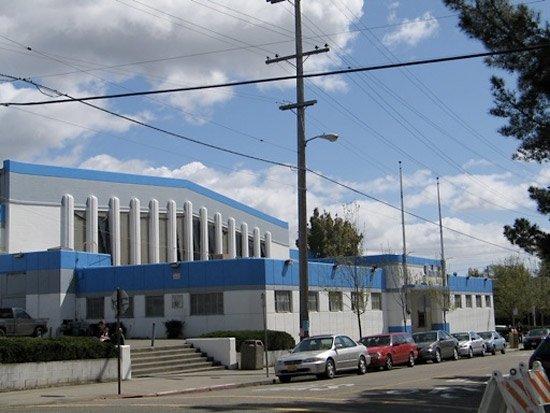
Berkeley Iceland, closed since 2007. Photo Credit: Save Berkeley Iceland.
Fun Fact: Frank Zamboni, the inventor of Zamboni machine Cayle mentioned,
ran Iceland, starting in 1956.
PBN: What’s your favorite game of all time?
Cayle: I like games that have a nice payoff for execution at the right moment. Bram Stoker's Dracula fits the bill perfectly. You can't just phone in a good score on BSD when you have it all set up. Not only do you have to set up all three multiballs, but you then have to make just the right shots under pressure to collect the massive castle jackpots.
PBN: Where’s your home turf?
Cayle: Seattle WA, U.S.A.
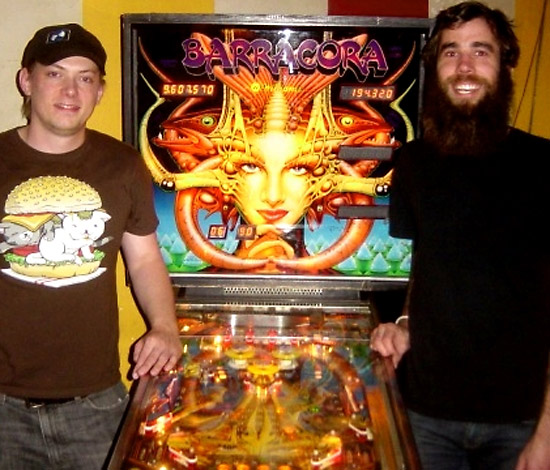
Cayle in the winner’s circle at Shortys, Seattle, with Brandon Smith in second
PBN: Who was the first good player you ever saw?
Cayle: One of the first truly good players I ever met in person was Lonnie Langford (LWL). He has dropped off the radar in the past few years and it is a real shame as I think he is one of the true greats. The first time you see someone like Lonnie play, your whole concept of the game changes. You begin to realize the level of deep strategy involved in the game, and the sheer mastery of flipper skills that can be achieved.
PBN: Compared to the longtime players such as Josh Sharpe or Bowen Kerins, you’re relatively new to competitive pinball. Why did you decide to play in tournaments?
Cayle: I played a bunch of pinball growing up - In high school in the mid 1990's and then in college at the University of Oregon. One day my university decided to run a high score tournament on Attack From Mars over the course of a week - winner take all. I made a number of attempts coming up just shy of the top score held by Eric Merchant - a great player from Eugene. On the final day of the event, I snuck away from class to take one final crack, and after a series of super jackpots came up with 15B for the win. I was the proud recipient of my prize: $10 in quarters.
PBN: Sounds like the forerunner to the TOPS tourneys we see today.
Cayle: After that I always wanted to compete in a more organized fashion but never knew where or how. It just never occurred to me that there was a whole culture revolving around competitive pinball, full of people who loved the game just as much as I did.
It wasn't until years later, in 2006, that I would enter another competition. I moved to Seattle at that time, and I decided to make the trek to PAPA9 after reading about it on the internet. I played B division that year.
PAPA has such a grueling format and I remember being so burnt out from the rush of that weekend - I qualified but was knocked out in the first round of the Finals. However, it was an amazing experience. I met and saw some great players there that year. It motivated me to practice harder and dive headfirst into competition.
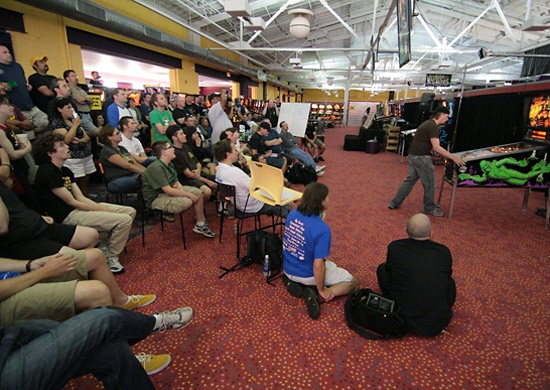
Cayle in the finals of A Division at PAPA 13 as the crowd watches the action
on the overhead screen. Try playing your best with this many people
looking over your shoulder.
Photo credit: PAPA
PBN: Neil Shatz is a very defensive control player. In contrast, Andrei Massenkoff is one of the best at really attacking the playfield. How would you describe your style?
Cayle: Some people say I'm good at finding the angle or quirks within each specific machine and using those factors to my advantage. I would agree, but I think of it more so as being a calculating player. I like to boil a game down to its basic parts and extract strategies that minimize risk and capitalize on opportunistic moments of skewed scoring balance - be it through a machine's rule set, or the physical setup of each machine.
I'm also told I have a pretty mean live catch. I think it can be a real advantage to have that particular flipper skill in my bag of tricks, and yet at the same time a detriment to my game - I find many of my errors in competition stem from a live trap attempt executed in the wrong situation.
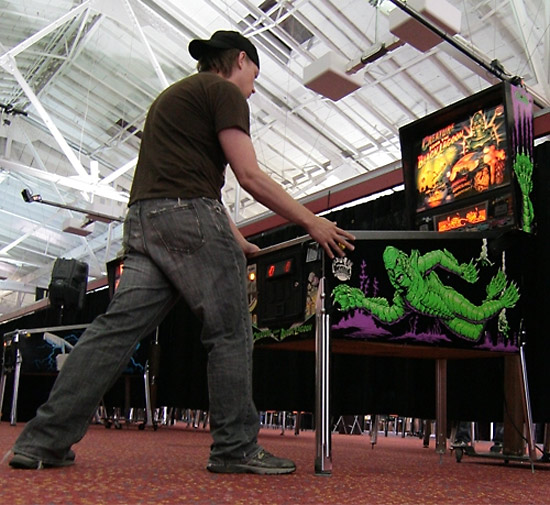
Cayle’s live catch skills were on full display at PAPA 13 - click here to watch
Photo credit: PAPA
PBN: A novice player is getting into a cab and says, “Cayle, what’s one thing I can do to improve my game? What’s your advice?"
Cayle: Play one-handed. You'll learn a lot really fast about ball physics, dead flipper passes (aka bounce passes) and nudging when you don't have direct control of both flippers. It is also a great way to evaluate risk versus reward within a game's rule set.
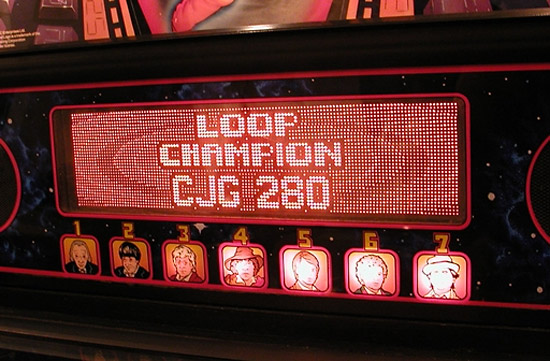
PBN: What was the process of getting better for you? Did you focus on a particular skill?
Cayle: I set my games up hard: tight tilts, steep playfield, tournament mode, extra balls off. I open up the outlanes on my games, and if that doesn't cut it I'll pull posts completely. I guess you could say it gets a bit out of hand sometimes. Often when people play my games they get a bit irritated that they are set up so difficult. But when you set games to punish you for even the slightest mistake, you are forced to fight for every score. You rapidly learn which shots are the most risky, which strategies minimize those risks and how you can score most effectively.
Pushing that further, sometimes I will play games set up for 2 balls per game. Playing down a ball is great practice for the random bad luck that can crop up in a pinball competition. Have a “house ball” on ball 1? Who cares, you're used to playing with 2 balls anyway.
PBN: Cayle, how do analyze a new game you’ve never played to win?
Cayle: I look for a simple strategy with a minimum number of shots. For example, in 2009 at IFPA 6 I had a match against a truly fantastic player and friend, Sean Grant, on Judge Dredd. At the time, I had only ever played one game of Judge Dredd at the previous year's PAPA and had almost no knowledge of the games rules. What I did know was that the left ramp built its value with each shot across the course of a ball, and that the wizard mode could be lucrative as a long-term goal - nothing else. My strategy? Keep it simple. Start modes and time them out by looping the left ramp. I ended up locking in the win with the highest score of the entire event.
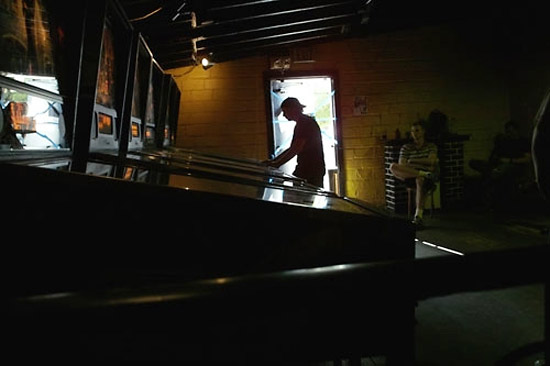
Cayle at Slabtown tournament in 2009
Photo credit: Ryan Gratzer
PBN: How do you prepare for a tournament?
Cayle: Often I will play with the specific intent to try and focus on consistency. I'll track my scores across sessions and in that fashion can easily visualize the current state of my game play. Additionally, with the same historical data I can run mock matches against myself, practicing the various formats the different tournaments run. I find it is important to get in the mindset of consistently putting up good scores, versus sometimes putting up great scores.
PBN: How do you deal with ‘tournament nerves’?
Cayle: It feels like the nerves have settled down over time. For a while it felt like at every event I was a complete wreck with the adrenaline and excitement. Now days, as long as I keep actively competing, it doesn't seem to affect me much. But honestly, I miss it - there are few experiences in life that match the rush of that first finals game in a big tournament.
PBN: To use a poker term, have there been any 'bad beats' along the way?
Cayle: I've had a few losses that have hurt over the years, some more than others. The 2nd place I took at the Canadian Pinball Championships in 2009 was particularly bittersweet. I played fantastic against some very tough competition and yet came up just shy of a major win. When it comes down to it though, these kinds of losses have simply been the result of the other competitors playing better and myself making mistakes. Every loss is a great learning experience and I would like to think they have made me a better player.
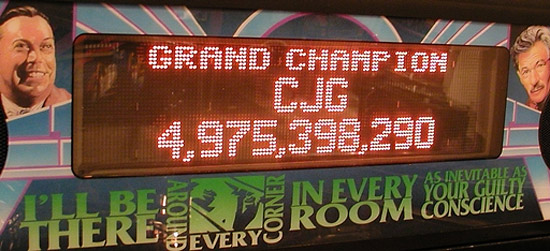
Not one of his bad games
PBN: What about distractions in tournaments?
Cayle: Nothing drives me more bonkers than being distracted in a tournament. For example, there I was at IFPA6 in the UK playing Neil Shatz and Jim Belsito on Bally Star Trek. I'm trying to come from behind on an important game and all of a sudden one of the players in a match behind our machine drains his ball and screams at the top of his lungs "SHEISSE!!!!!" as he JUMPS OUT OF THE WINDOW right in my field of view. I mean seriously, how are you supposed to deal with that?
PBN: Seriously? Yikes! Out the window? How did you come out that game? (On a side note: if I’m ever playing against you in a tournament I’ll look for a nearby window…)
Cayle: Literally right out of a window. I can't remember the outcome of that game, it was too traumatic.
PBN: Are you intimidated by other top players in a competition? Do guys like Keith Elwin or the Sharpe brothers intimidate you?
Cayle: I'm actually always excited and eager to be matched up against the great players out there. I really feed off of the competition and it brings out my best game. Some of my favorite match ups have been against the top players, and I am honored for those opportunities.
PBN: While we’re on the subject of competitive pinball, is it all just a bunch of guys trying to out-macho each other? Do the high level players even have fun playing any more? Should we mere mortals ever think about competing in tournaments?
Cayle: Everyone should compete. We're all just looking to have a good time while seeking out a great challenge.
PBN: You made it to the final four in the A Division at PAPA this year. You’ve managed 15th place or better at each PAPA since 2007. What were your goals heading into this year’s PAPA? Do you think a win can’t be far off?
Cayle: Every year at PAPA I try and bring my best game. My central goal is to always have a good time, and compete for the sheer fun and excitement of it. This year was no different - the final four was exceptional and I am very happy with the way I played. As for future PAPA events, I can't say. I do know I will keep coming back, having a great time and trying my best.
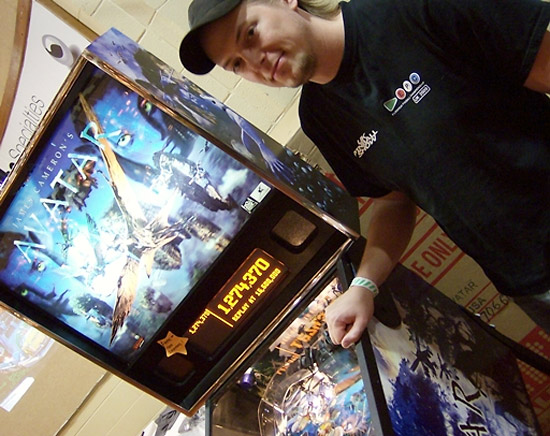
Cayle taking a break to play some Avatar at the
Marco Specialties booth at PPE 2010
PBN: What was your greatest pinball moment, tournament or otherwise?”
Cayle: Shorty's 2007 in Seattle, WA, would have to rank high up there. It was the first big event I won. Playing in the Finals on Williams Flash, head-to-head in front of a big crowd, and rolling the machine over on the final game was a truly special experience. I was matched up against Eden Stamm, and it was the start of a great friendship.
PBN: Who are the players that have inspired you?
Cayle: Watching Lyman win PAPA 9 was amazing. He has such a unique ability to control the entire playfield. Neil Shatz' micromanagement in multiball, and his stamina to grind some amazing strategies continue to blow my mind. Keith Elwin, Jorian Engelbrektsson... You meet some of these guys and watch them play, and in 5 minutes you'll see things you've never seen anywhere else. I've always wanted to get to the level of complete control these guys have over a machine.
PBN: I met Neil at the Pacific Pinball Museum and asked him if he’d play a few rounds with me. Watching him play one game of Fun House was the experience that made me realize pinball is not a game of luck, and how there was so much more to pinball than I understood previously.
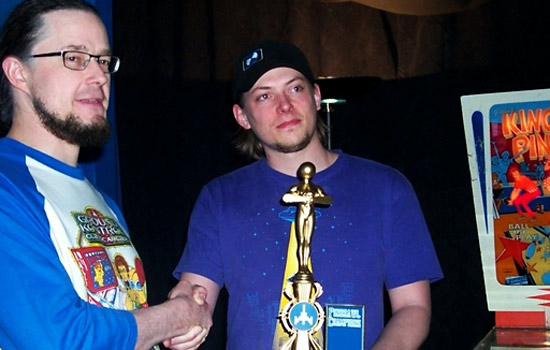
Portland Pinbrawl 2009
PBN: What do you think about tournament pinball going forward, or just the Industry in general?
Cayle: Tournament pinball seems to be getting stronger every day. It's exciting to see the level of competition increase each year. On the other hand, the outlook for the pinball industry seems pretty shaky. I would love to see a manufacturer start pushing out games that test the limits of the platform, but currently pinball as a commercial product seems to be hanging on for dear life without the means to do so.
PBN: You work professionally in the field of video games. What’s your video game background? Any tournament wins?
Cayle: I work as a designer at a game studio called Valve. In the past few years I have mainly been working on multiplayer FPS (First Person Shooter) games. From a tournament perspective I have never been much of a competitor in video games - my brief foray into competitive gaming consisted mainly of "griefing" other teams in Counter-Strike with my friend in University... Like most people, I pretty much just play games casually for fun.
PBN: What design element staples of the video game world do you think would add to the pinball experience?
Cayle: One of the biggest things I think is missing from pinball, that is often encouraged in video games, is a mod community that is supported by game developers. Pinball manufacturers should make tools available to the public for modifying the rule set and code of their games. I truly understand the issues, problems, and liability questions this raises, but a successful community of end user game developers would help pinball grow beyond its current marketplace.
PBN: If you could design a video pinball game, what would it look like?
Cayle: Something like this:
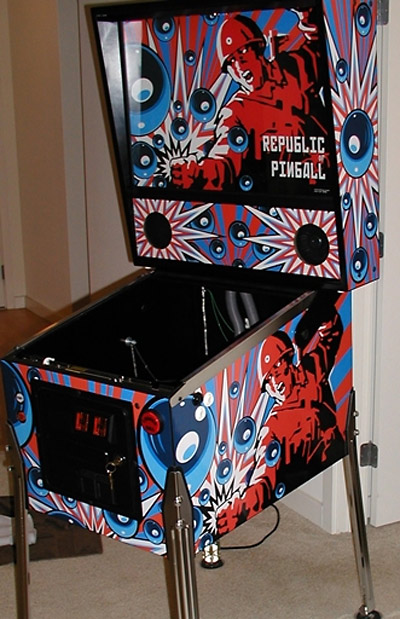
A snub-nosed custom virtual pin cab
PBN: Thanks very much for contributing your time to this interview, Cayle. One last question: what does pinball mean to you?
Cayle: Hold on! Just one more game...
 Back to the Interviews page Back to the Interviews page
 Back to the Learn page
Back to the Learn page
 Back to the
front page
Back to the
front page
© Pinball News 2010
|












